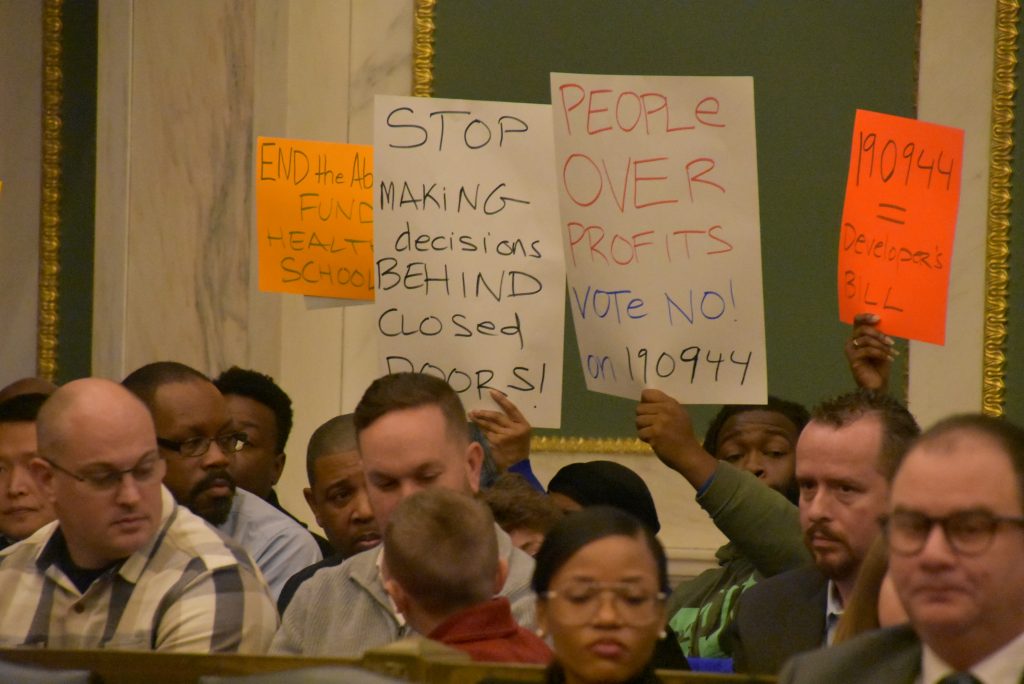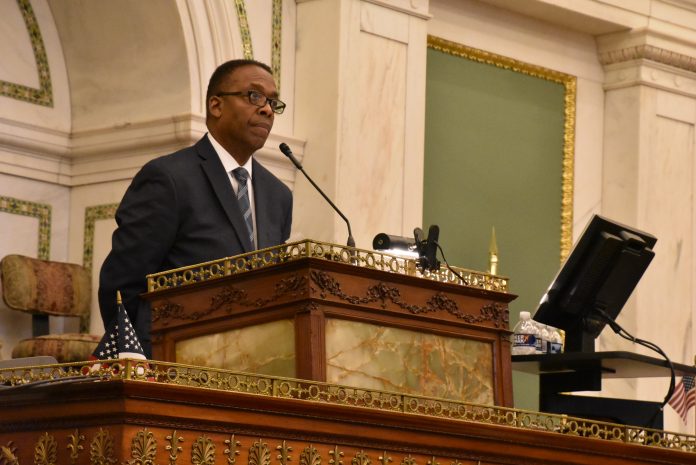City Council held a marathon session on Thursday, passing a boatload of legislation before the end of its four-year cycle and the departure of four of its members.
All bills not passed last week would have to be reintroduced in January and wind their way back through the legislative process.
The most notable bill passed Thursday altered the contentious 10-year tax abatement for new construction and major rehabilitation projects. Though it was approved unanimously, the legislation was not without controversy.
It applies only to residential new construction. Commercial projects and renovations to residential properties will still be able to get the full abatement, which allows a property owner to pay taxes just on their land.
Starting Dec. 31, 2020, there will be a “phase-down” where developers who secure an abatement for new residential construction will get the full abatement for the first year, a 90 percent abatement the second year, an 80 percent abatement the third year, and so on, until the tax break expires.
Research provided by council officials indicates the change will generate as much as $275 million over the next 10 years. More than half, 55 percent, will be directed to the School District of Philadelphia.
Advocates lined up Thursday at City Hall to oppose the bill, arguing it didn’t go far enough. Many urged a full and immediate repeal of the abatement to provide additional funding to the school district, which is dealing with a number of high-profile building maintenance issues.
“It’s a first step, and people are right to be here to demand more for their schools,” said Councilwoman At-Large Helen Gym, a longtime public school supporter, before the vote.
“It’s a complete crisis,” she added. “It’s why we’re making this change. Just because we made this change doesn’t mean it’s over.”
The bill represents the first time the abatement program has been changed since it was enacted two decades ago. Council President Darrell Clarke said it made sense not to touch the commercial side of the abatement.

“Keeping the 10-year tax abatement for commercial I think in the long run pays off because it does create jobs and significant spin-offs as it relates to the wage tax and people moving into the city of Philadelphia for job purposes,” he said.
Clarke said it was important to keep the full abatement for residential rehabilitation projects because there are parts of the city with little buildable land but plenty of opportunities for renovations to existing buildings.
Mayor Jim Kenney is expected to sign the legislation, which also provides for a periodic study of the abatement.
As council pulled back one tax break, it voted to expand another. The Homestead Exemption, a popular program that reduces tax assessments for owner-occupied properties, was increased from $45,000 to $50,000 a year.
Officials estimate the change will affect 220,000 homeowners and cost the city about $15 million a year.
It’s not clear whether the increase will receive Kenney’s approval.
Plastic bags get the ax
The clock is ticking for the familiar single-use plastic bags used at supermarkets, convenience stores and most other shops in the city.
Council easily voted to ban the bags, a major source of pollution, in favor of paper bags that are made from recyclable material and are easier to recycle themselves. The legislation is scheduled to go into effect July 2.
“We need to stop being a disposable society and strive toward becoming a more reusable society,” First District Councilman Mark Squilla, the bill’s sponsor, said.
Councilmen Brian O’Neill and David Oh were the only members who voted against the ban. O’Neill told the Times last month that he believes it will give Northeast residents another reason to drive to the suburbs for their groceries.
The original bill included a 15-cent fee on paper bags to encourage shoppers to bring their own. It was eliminated during an October committee hearing, when council members and officials from Kenney’s administration expressed resistance.
However, the idea may not be dead. Squilla said he would make it a priority to explore adding the fee in the future.
“It’s still known in the environmental world that a fee works best as a deterrent,” he told the Times. “We’re hoping with the advocacy from the environmentalists and others we can continue and hopefully maybe see if a fee could be implemented in the new year.”
A second version of the bill was further tailored to make sure retailers wouldn’t be able to skirt the provision. It also calls on the city to review the impact of the ban.
Food trucks and CBAs
A bill sponsored by Sixth District Councilman Bobby Henon to allow food trucks to set up at Cottman and Bustleton avenues was approved.
As previously reported by the Times, the vendors moved in the P.C. Richard & Son parking lot after a bill banning sidewalk sales in O’Neill’s district went into effect.
Henon’s district already prohibited food trucks, but the bill passed on Thursday carves out spaces along the busy intersection.
Council also passed a bill to require developers of large projects to negotiate Community Benefits Agreements with neighbors. It’s legislation that could affect civic associations in the Northeast.
The provision applies to projects with 100,000 square feet of “earth disturbance,” such as excavation, or 250,000 square feet of gross floor area that receive support or financial assistance from the city.
In the event of such a proposal, a five-member “Host Community Board” will be formed, with one person picked by the district councilperson, one by the Registered Community Organization and another by the city Department of Planning and Development. The remaining two members would be appointed by the first three.
CBAs are legal agreements typically negotiated by community groups to get developers to provide benefits to neighbors to offset any disturbance the project may have on the area. ••
Jack Tomczuk can be reached at [email protected].






